The Great Career Reset: Why Some Thrive While Others Barely Survive
Faced with the challenges of the COVID-19 pandemic, many professionals are struggling to remain positive about their careers. Worries about job security and finances, as well as the blurred boundaries between work and home, mean that burnout and mental health concerns have become even more prevalent in today’s workplace.1 These realities are driving people to reassess what’s most important in their careers and forcing them to look at ways of remaining resilient in an uncertain future.
To better understand how to support professionals and their development needs, GetSmarter, a 2U, Inc. brand, surveyed 648 people across the globe, exploring their attitudes towards work now compared to 12 months ago. Participants were asked to rate their current feelings across a broad spectrum, and these were grouped into four main emotional states:
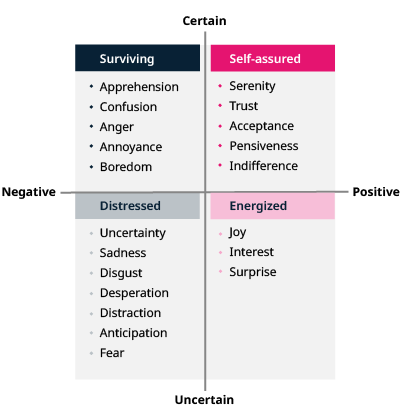
GetSmarter’s research found that the majority of respondents feel more distressed about their careers and less self-assured post-COVID-19. For many, the fear surrounding the virus has been overwhelming, with social distancing and career uncertainty leaving them feeling more isolated and anxious than before.2
On the other hand, the research also revealed that more people have been feeling energized in recent months. While the pandemic has been disruptive, it’s also given people the opportunity to reassess their careers and take a more active approach in preparing for change.
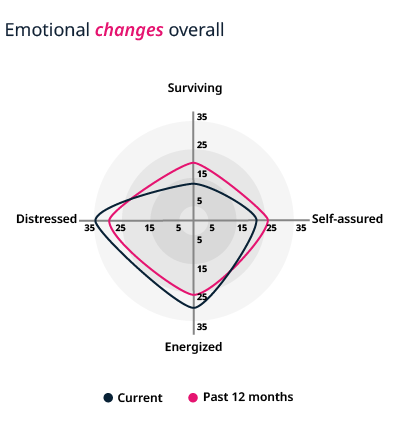
Women are facing the biggest challenges
Despite both men and women feeling an increased sense of uncertainty around their careers (7% and 9% respectively), many women have had to navigate bigger hurdles in the wake of COVID-19.
The pandemic has exacerbated challenges that many women already face in the workplace, leaving them feeling more distressed about their careers than their male colleagues. Women are more vulnerable to job losses due to the fact that many of the industries affected have had proportionally more female workers, there are pre-existing gender inequalities in the workplace, and women take on more of the family responsibilities.3 As a result, as many as two million women are considering furloughing or leaving work completely in the United States alone.4
For those women who remain employed, the number of mothers with young children who opted to cut their work hours is four times larger than fathers.5 This has more than doubled the gap between the number of hours worked by men and women,6 and could have a long-lasting impact on efforts towards building a more equal working landscape.
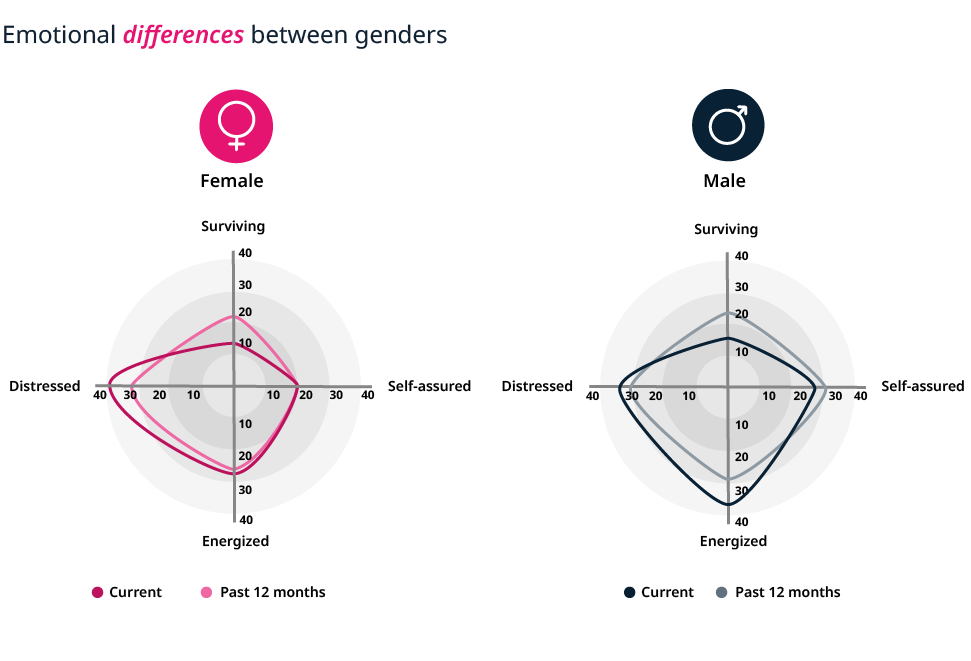
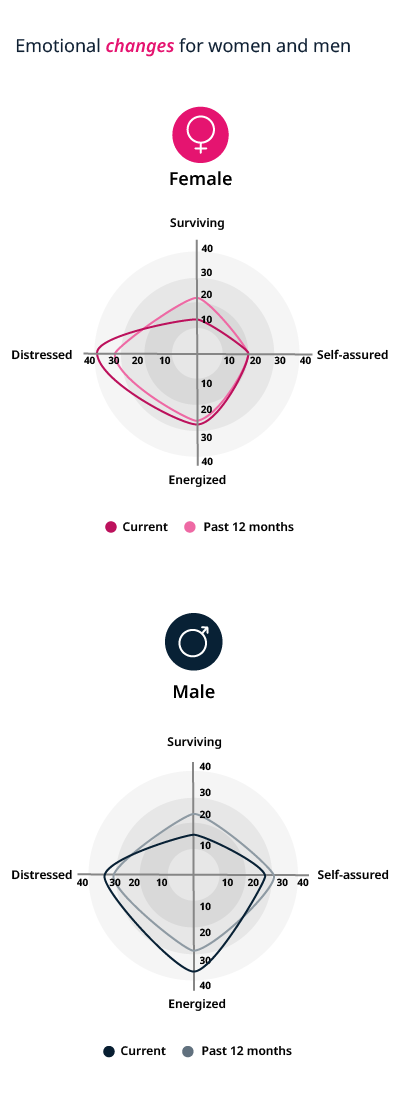

Generation X and Generation Z take strain while millennials feel energized
The added pressure of parenting and family responsibility in a time of COVID-19 can also be seen when looking at work attitudes on a generational level.
Over the past year, many Generation Xers have had to homeschool their children for the first time while simultaneously holding down a job.7 The stress of this, on top of potential health concerns for their family and elderly parents,8 have left them the most distressed out of all the generations.
In contrast, millennials, who have comparatively fewer responsibilities, are feeling the most energized (35%). They also appear to have more interest in their careers now than they did last year. Based on GetSmarter’s ‘The Future of Work Is Here’ report findings, this may be due to younger generations being more adaptive and resilient as a result of growing up in an era of constant disruption.9 Overall, studies have found that professionals in this age group are the most optimistic about the opportunities surrounding the work shift, seeing it as a chance to drive the change they want to see in the way they perform their roles.10
That doesn’t mean the crisis hasn’t affected younger workers though. Pandemic-related closures have had a major impact on younger generations, with Generation Zs arguably experiencing the most disruption in a time in their lives that’s critical for professional and personal growth.11 More than a quarter of Generation Zs and a quarter of younger millennials reported that they’d either lost their jobs or been placed on unpaid leave by May 2020.12 This has seen more Generation Zs feeling like they’re simply ’surviving’ in their careers (29%), and has resulted in a significant decrease in their self-assuredness, from 25% to 13%.
To find out more about the effects of the pandemic on careers, read the next article in this series: The Great Career Reset: The Positive and Negative Impact of COVID-19
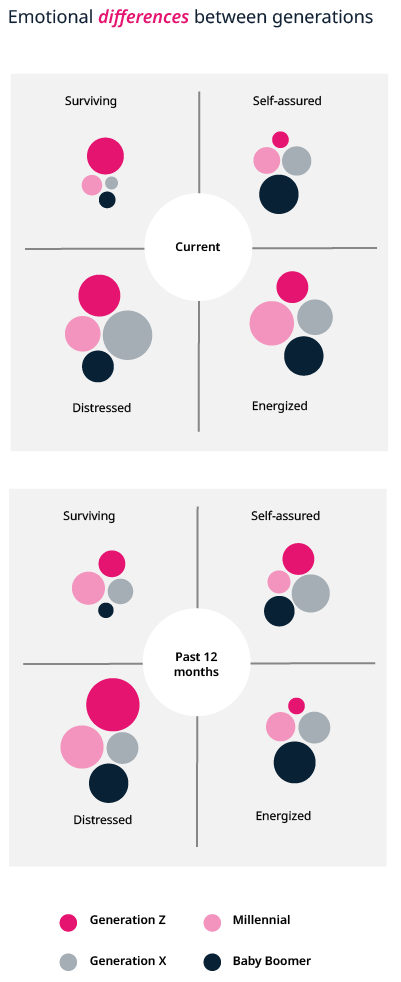
How people are reacting
The uncertainty that COVID-19 has placed on careers has shone a spotlight on the need for people to remain adaptive in the face of change. As a result, there’s been a surge in professionals prioritizing upskilling as a way to prepare. This was especially prevalent in the beginning of the pandemic, where there was a significant spike in interest for online courses.13
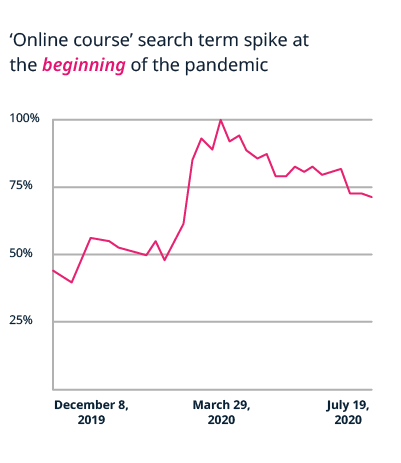
By investing in their skill sets, people are empowering themselves to become more resilient to unexpected challenges and are gaining the freedom to explore more options beyond their current nine-to-five jobs. When looking at the most important skills people want to learn in 2021 from GetSmarter’s survey, it’s clear that they’re focusing on gaining transferable skills that will equip them to work across a variety of sectors, rather than more industry-specific ones. Most notably, the majority of people rank leadership and soft skills at the top of the list.
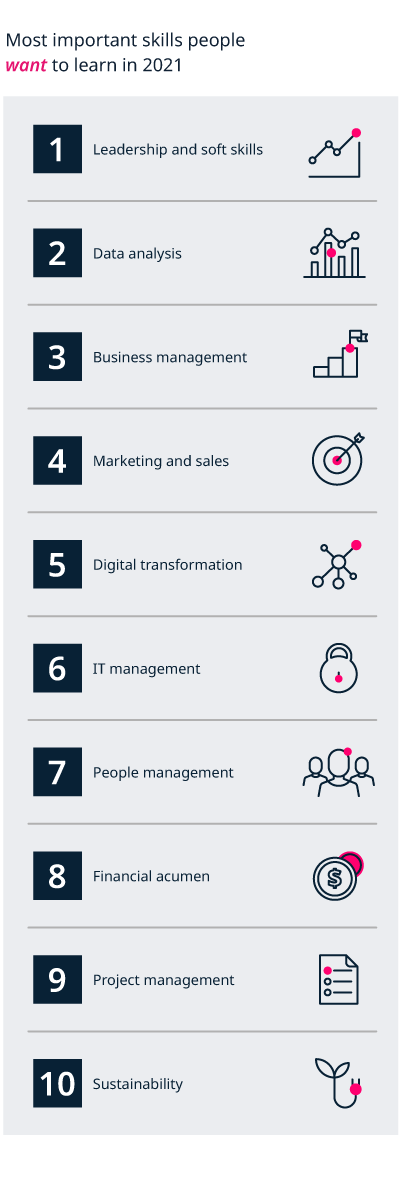
Learn more about how people are adapting their growth and development paths in the article: The Great Career Reset: Pivoting From a Career Plan to a Skills Plan
While the pandemic has closed doors, it has also opened new windows of opportunity, leaving workers more engaged and energized about their careers than in years gone by. The future may be unknown, but it holds the chance for people to grow, rethink their priorities, and reflect on what they want their professional lives to look like in the long term.
Whether you’re changing jobs or simply looking to keep up with a changing world, GetSmarter’s new Career Navigator tool is designed to help you plan your skills development and find opportunities for growth in your professional sphere.
Discover which skills to focus on for your future with the Career Navigator tool.
- 1 Fox, M. (Jul, 2020). ‘Remote work burnout is growing as pandemic stretches on. Here’s how to manage it’. Retrieved from CNBC.
- 2 Serafini, G. et al. (Jun, 2020). ‘The psychological impact of COVID-19 on the mental health in the general population’. Retrieved from Oxford Academic.
- 3 Madgavkar, A. et al. (Jul, 2020). ‘COVID-19 and gender equality: Countering the regressive effects’. Retrieved from McKinsey.
- 4 Thomas, R. et al. (2020). ‘Women in the workplace’. Retrieved from McKinsey and LeanIn.
- 5 Elsesser, K. (Jul, 2020). ‘Moms cut work hours four times more than dads during pandemic‘. Retrieved from Forbes.
- 6 Elsesser, K. (Jul, 2020). ‘Moms cut work hours four times more than dads during pandemic‘. Retrieved from Forbes.
- 7 Schwabel, D. (Aug, 2020). ‘How COVID-19 has impacted different generations of workers’. Retrieved from LinkedIn.
- 8 Stieg, C. (Mar, 2020). ‘The psychological reasons why Gen X may be taking COVID-19 more seriously than boomers and millennials’. Retrieved from CNBC.
- 9 (Sep, 2020). ‘The Future of Work Is Here’. Retrieved from GetSmarter.
- 10 Parmelee, M. (Jun, 2020). ’The Deloitte Global Millennial Survey 2020: Highlights’. Retrieved from Deloitte.
- 11 Schwabel, D. (Aug, 2020). ‘How COVID-19 has impacted different generations of workers’. Retrieved from LinkedIn.
- 12 Schwabel, D. (Aug, 2020). ‘How COVID-19 has impacted different generations of workers’. Retrieved from LinkedIn.
- 13 (Nd). ‘Online course search term’. Retrieved from Google Trends. Accessed 22 December 2020.